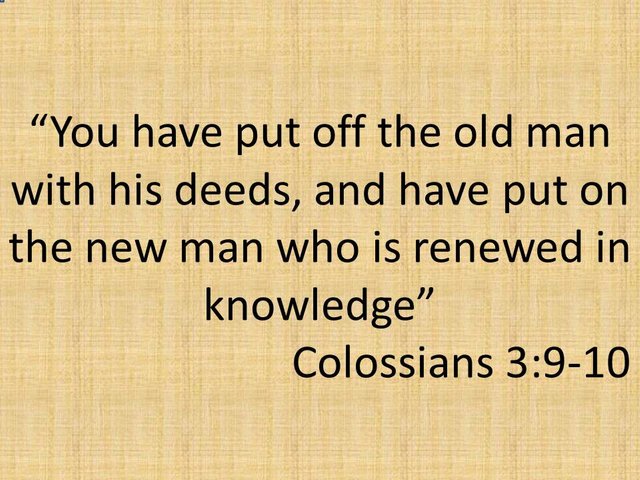Paul gives us an example of the new man: Jesus. The new man is the man who abandons the slavery of sin (old man) and embraces the freedom of the truth:
"You have put off the old man with his deeds, and have put on the new man who is renewed in knowledge according to the image of Him who created him" Colossians 3: 9-10

Paul explains that the new man is an image, the likeness or similarity occurs in the essence, for example we are similar to God when we are wise as God is wise: "Be perfect as your heavenly Father is perfect", Matthew 5:48.
But the image is perfect likeness, for example the image is between twins, not between brothers of different births. And this image is renewed in the perfect knowledge.
The perfect knowledge is the wisdom of God, the knowledge of the correct means to live, this knowledge is progressive, this is why it renews us.
We reach the image of God when the fruits of the spirit are manifested in us: "But the fruit of the spirit is love, joy, peace, forbearance, kindness, goodness,faithfulness, gentleness, self-control. Against such things there is no law." , Galatians 5:22-23.
The old man is the man who lives according to the flesh, while the new man is the man who lives, according to the spirit. Everyone in baptism is called to this commitment, and this is the spiritual gift of conversion.
The parable of the good samaritan is an example of what conversion means, we live like the old man as the priest or the levite, or we live like the new man as the good samaritan:
"A man was going down from Jerusalem to Jericho, when he was attacked by robbers. They stripped of his clothes, beat him and went away, leaving him half dead. A priest happened to be going down the same road, and when he saw the man, he passed by the other side. So too, a levite, when he came to the place and saw him, passed by the other side. But a samarithan, as he traveled, came where the man was; and when he saw him, he took pity on him. He went to him and bandage him wounds, pouring on oil and wine. Then he put the man on his own donkey, brought him to an inn and took care of him. The next day he took out two denarii and gave them into the innkeeper. ´Look after him´ he said, ´and when I return, I will reimburse you for any extra expense you may have.´
Which of these three do you think was a neighbor to the man who fell into the hands of the robbers?" Luke 10:25-37.
The good and the evil are ethical solutions, we choose between God and money, between the sin or the righteousness.
For more information, visit my profile, follow the link, and download for free my ebook.
Authors get paid when people like you upvote their post.
If you enjoyed what you read here, create your account today and start earning FREE STEEM!
If you enjoyed what you read here, create your account today and start earning FREE STEEM!